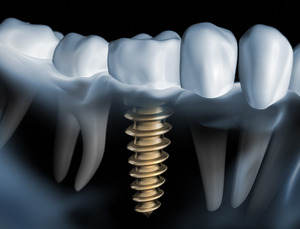
Dental implants are one of the most popular and celebrated methods of replacing teeth, and one of the main things that they have going for them is their stunning durability. They regularly outlast other methods of tooth replacement by a factor of two to one, often lasting a lifetime if maintained well.
You might wonder what it is that sets dental implants apart, and why they endure as long as they do. There are several reasons; if you’re curious, here are a few of the most important.
Osseointegration
Dental implants are composed of biocompatible materials such as titanium, which is exceptionally compatible with bone tissue. During the healing process, the implant fuses with the jawbone through a biological process called osseointegration. This integration provides a strong and stable foundation for the artificial tooth or teeth mounted on the implant. Once osseointegration is complete, the implant becomes a part of the jawbone, mimicking the natural tooth root. This structural integration ensures that dental implants can withstand chewing forces similar to natural teeth without causing damage to surrounding bone or tissues.
Material Strength and Stability
Titanium and other materials used in dental implants are chosen for their strength, stability, and corrosion resistance. These materials are designed to withstand the daily pressures of biting and chewing without degradation over time. Unlike natural teeth, which can decay or weaken, dental implants are not susceptible to cavities. Properly cared for, they do not undergo structural changes that would compromise their function or appearance. The prosthetic tooth or crown attached to the implant is also made from durable materials like porcelain or ceramic, which are resistant to wear and stains.
Professional Placement and Maintenance
The success and longevity of dental implants heavily depend on the skill and experience of the dental professional placing them. Precise surgical placement ensures proper alignment and stability within the bone structure. Additionally, post-operative care and regular dental check-ups are crucial for maintaining oral health and monitoring the condition of the implant and surrounding tissues. Good oral hygiene practices, including brushing, flossing, and regular dental cleanings, help prevent peri-implant diseases and ensure the long-term success of the implant.
About the Author
Dr. Brett Noorda has spent the last 25 years going above and beyond in the field of dentistry, making use of the most advanced techniques in dental medicine to help his patients smile their absolute brightest. He also knows that dental implants can be intimidating, which is why he endeavors to make his care comfortable for his patients. Dr. Noorda received his dental degree from the Oregon Health Sciences University School of Dentistry, and has since completed well over 1400 hours of continuing education in his field.
If you have any questions about dental implants, he can be reached at his website or by phone at (702) 456-7403.
